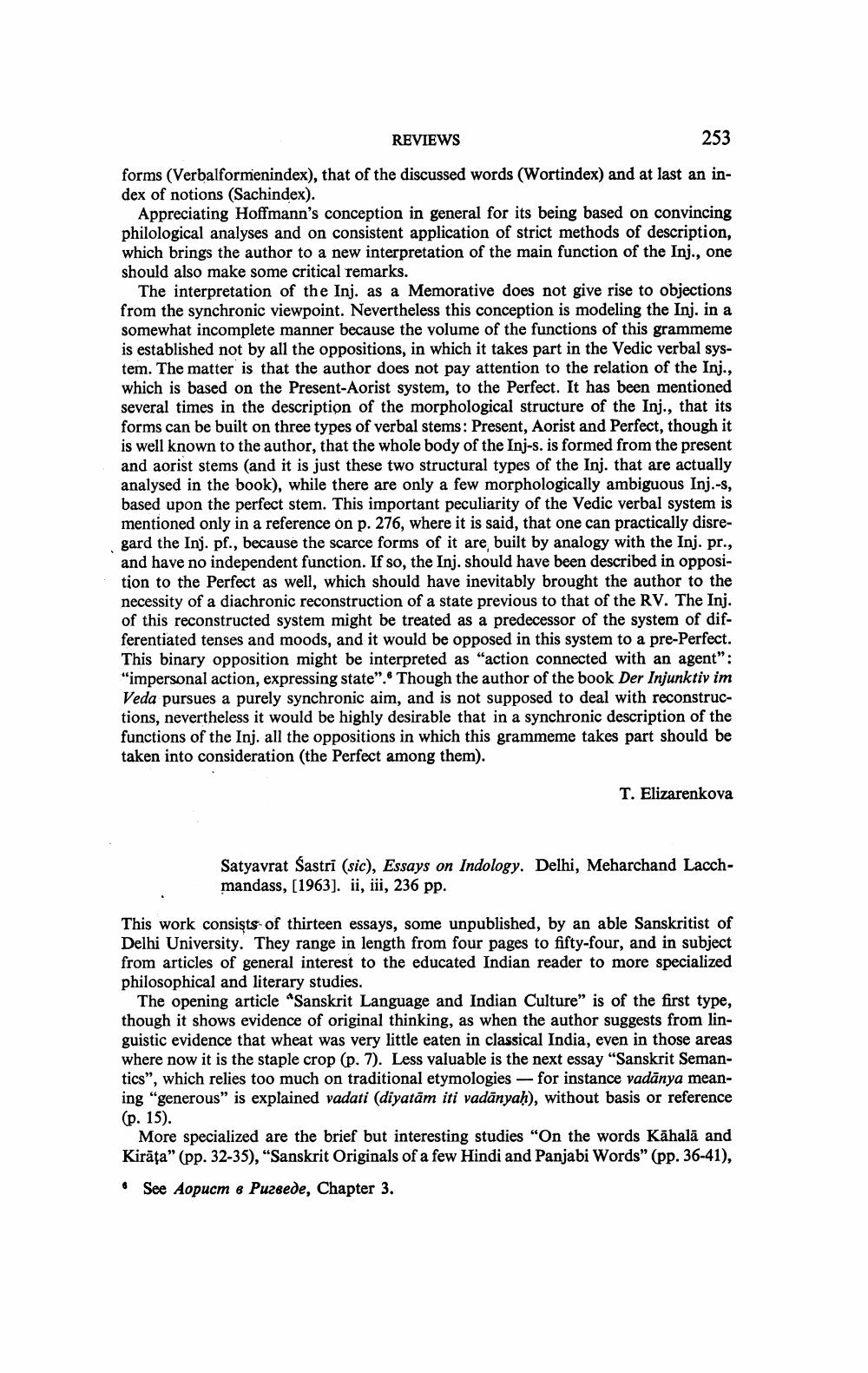Book Title: Reviews Of Different Books Author(s): Publisher: View full book textPage 7
________________ REVIEWS 253 forms (Verbalformenindex), that of the discussed words (Wortindex) and at last an index of notions (Sachindex). Appreciating Hoffmann's conception in general for its being based on convincing philological analyses and on consistent application of strict methods of description, which brings the author to a new interpretation of the main function of the Inj., one should also make some critical remarks. The interpretation of the Inj. as a Memorative does not give rise to objections from the synchronic viewpoint. Nevertheless this conception is modeling the Inj. in a somewhat incomplete manner because the volume of the functions of this grammeme is established not by all the oppositions, in which it takes part in the Vedic verbal system. The matter is that the author does not pay attention to the relation of the Inj., which is based on the Present-Aorist system, to the Perfect. It has been mentioned several times in the description of the morphological structure of the Inj., that its forms can be built on three types of verbal stems: Present, Aorist and Perfect, though it is well known to the author, that the whole body of the Inj-s. is formed from the present and aorist stems (and it is just these two structural types of the Inj. that are actually analysed in the book), while there are only a few morphologically ambiguous Inj.-s, based upon the perfect stem. This important peculiarity of the Vedic verbal system is mentioned only in a reference on p. 276, where it is said, that one can practically disregard the Inj. pf., because the scarce forms of it are built by analogy with the Inj. pr., and have no independent function. If so, the Inj. should have been described in opposition to the Perfect as well, which should have inevitably brought the author to the necessity of a diachronic reconstruction of a state previous to that of the RV. The Inj. of this reconstructed system might be treated as a predecessor of the system of differentiated tenses and moods, and it would be opposed in this system to a pre-Perfect. This binary opposition might be interpreted as "action connected with an agent": "impersonal action, expressing state". Though the author of the book Der Injunktiv im Veda pursues a purely synchronic aim, and is not supposed to deal with reconstructions, nevertheless it would be highly desirable that in a synchronic description of the functions of the Inj. all the oppositions in which this grammeme takes part should be taken into consideration (the Perfect among them). T. Elizarenkova Satyavrat Sastri (sic), Essays on Indology. Delhi, Meharchand Lacchmandass, [1963). ii, iii, 236 pp. This work consists of thirteen essays, some unpublished, by an able Sanskritist of Delhi University. They range in length from four pages to fifty-four, and in subject from articles of general interest to the educated Indian reader to more specialized philosophical and literary studies. The opening article *Sanskrit Language and Indian Culture" is of the first type, though it shows evidence of original thinking, as when the author suggests from linguistic evidence that wheat was very little eaten in classical India, even in those areas where now it is the staple crop (p. 7). Less valuable is the next essay "Sanskrit Semantics", which relies too much on traditional etymologies -- for instance vadanya meaning "generous" is explained vadati (diyatam iti vadanyah), without basis or reference (p. 15). More specialized are the brief but interesting studies "On the words Kahala and Kirata" (pp. 32-35), "Sanskrit Originals of a few Hindi and Panjabi Words" (pp. 36-41), See Aopucm e Puzeede, Chapter 3.Page Navigation
1 ... 5 6 7 8 9 10 11 12 13 14 15 16 17 18 19 20 21 22 23 24 25 26 27 28 29 30 31 32 33 34 35 36 37 38 39 40 41 42 43 44 45 46 47 48
